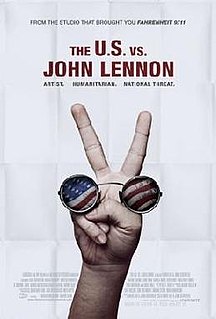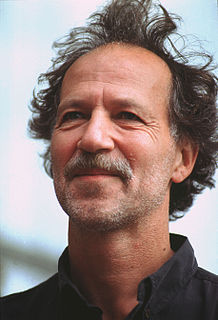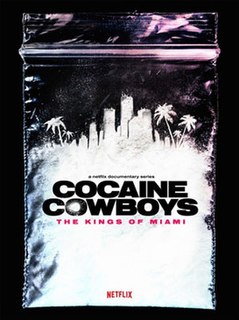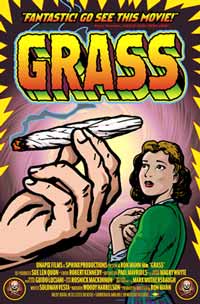
Lock, Stock and Two Smoking Barrels is a 1998 British black comedy crime film written and directed by Guy Ritchie, produced by Matthew Vaughn and starring an ensemble cast featuring Jason Flemyng, Dexter Fletcher, Nick Moran, Steven Mackintosh, Sting with Vinnie Jones and Jason Statham in their feature film debuts.
This article is intended to give an overview of several arguments for and against drug prohibition.
Ronald Mann, credited professionally as Ron Mann, is a Canadian documentary film director.

The Last Days is a 1998 documentary film directed by James Moll and produced by June Beallor and Kenneth Lipper; Steven Spielberg, in his role as founder of the Shoah Foundation, was one of the film's executive producers. The film tells the stories of five Hungarian Jews during the Holocaust, focusing on the last year of World War II, when Nazi Germany occupied Hungary and began mass deportations of Jews in the country to concentration and extermination camps, primarily Auschwitz. It depicts on the horrors of life in the camps, but also stresses the optimism and perseverance of the survivors.

The U.S. vs. John Lennon is a documentary film about Lennon's transformation from member of the Beatles to anti-war activist opposing the reelection of Richard Nixon as president in 1972. The film also details the attempts by the Nixon administration to deport Lennon from the US to end his anti-war and anti-Nixon campaigns. The film had its world premiere at the Venice Film Festival and its North American premiere at the Toronto International Film Festival. It was released in New York City and Los Angeles, California on 15 September 2006, and had a nationwide release on 29 September. A soundtrack composed of John Lennon tracks was released by Capitol Records and EMI on 26 September 2006.

In the United States, the non-medical use of cannabis is legalized in 19 states and decriminalized in 12 states as of May 2022. Decriminalization refers to a policy of reduced penalties for cannabis offenses, typically involving a civil penalty for possessing small amounts, instead of criminal prosecution or the threat of arrest. In jurisdictions without penalty the policy is referred to as legalization, although the term decriminalization is sometimes used for this purpose as well.

In the United States, increased restrictions and labeling of cannabis as a poison began in many states from 1906 onward, and outright prohibitions began in the 1920s. By the mid-1930s cannabis was regulated as a drug in every state, including 35 states that adopted the Uniform State Narcotic Drug Act. The first national regulation was the Marihuana Tax Act of 1937.

Veterans for Medical Cannabis Access (VMCA), which was founded as Veterans for Medical Marijuana Access (VMMA) reflecting the pejorative word "marijuana", is an Elliston, Virginia-based non-profit service organization designed to assist American veterans who wish to be able to use marijuana for medical purposes with a doctor's recommendation. VMCA works towards the freedom for veterans to discuss the medical use of marijuana with their doctors without the risk of reprisal.

Leaves of Grass is a 2009 American black comedy film written and directed by Tim Blake Nelson. It stars Edward Norton as twin brothers, alongside Richard Dreyfuss, Nelson, Susan Sarandon, Melanie Lynskey and Keri Russell.

The use, sale, and possession of cannabis over 0.3% THC in the United States, despite laws in many states permitting it under various circumstances, is illegal under federal law. As a Schedule I drug under the federal Controlled Substances Act of 1970, cannabis over 0.3% THC is considered to have "no accepted medical use" and have a high potential for abuse and physical or psychological dependence. Cannabis use is illegal for any reason, with the exception of FDA-approved research programs. However, individual states have enacted legislation permitting exemptions for various uses, including medical, industrial, and recreational use.

The Union: The Business Behind Getting High is a 2007 Canadian documentary film directed by Brett Harvey and starring Joe Rogan, Norm Stamper, Chris Bennett, Tommy Chong, and Lester Grinspoon. Its theatrical run was limited to film festivals.

The House I Live In, directed by Eugene Jarecki, is a 2012 documentary film about the War on Drugs in the United States.

Our Nixon is an all-archival documentary providing a view of the Nixon presidency through the use of Super-8 format home movies filmed by top Nixon aides H.R. Haldeman, Dwight Chapin and John Ehrlichman, combined with other historical material such as interviews, oral histories and news clips. It was directed by Penny Lane.

The Culture High is a 2014 feature-length documentary film directed by Brett Harvey. It is about the marijuana prohibition and the war on drugs in United States. It is the sequel of the 2007 The Union: The Business Behind Getting High.
Cannabis in Namibia is illegal for recreational and medicinal uses, but cannabis, just like mandrax (methaqualone), are the most popular illicit drugs in the country. Cannabis also has an history of use as a traditional medicine by local indigenous communities. Per the 2011 UNODC report, the incidence of annual cannabis usage in Namibia was 3.9% as of 2000.

13th is a 2016 American documentary film by director Ava DuVernay. The film explores the "intersection of race, justice, and mass incarceration in the United States;" it is titled after the Thirteenth Amendment to the United States Constitution, adopted in 1865, which abolished slavery throughout the United States and ended involuntary servitude except as a punishment for conviction of a crime.
The list includes and details significant events that occurred in the global history of national-level implementations of, or changes made to, laws surrounding the use, sale, or production of the psychoactive drug cannabis.

Werner Herzog is a German filmmaker. Part of the New German Cinema, Herzog's films often feature ambitious protagonists with impossible dreams, people with unique talents in obscure fields, or individuals who are in conflict with nature.

Cocaine Cowboys: The Kings of Miami is a 2021 six part docuseries chronicling the rise and fall of Miami drug kingpins Sal Magluta and Willy Falcon. The two were eventually indicted in one of the largest drug cases in United States history, accused of illegally smuggling 75 tons of cocaine into the country. The series is directed by Billy Corben who previously directed three Cocaine Cowboys features.














